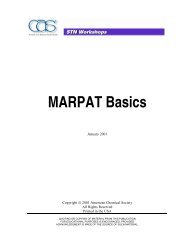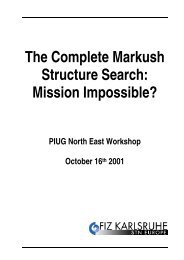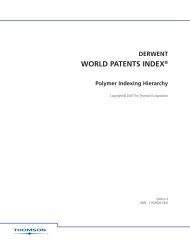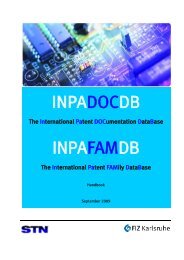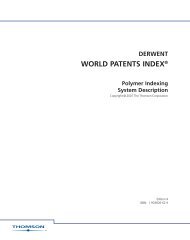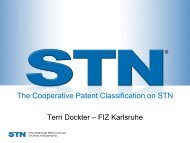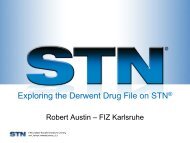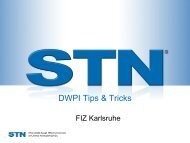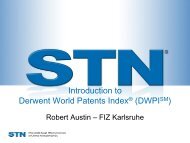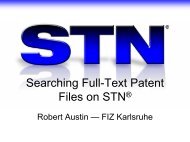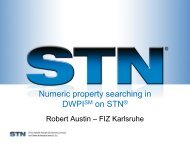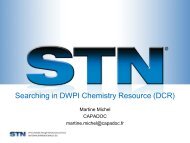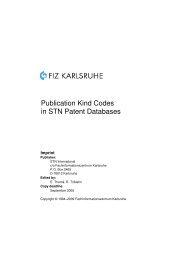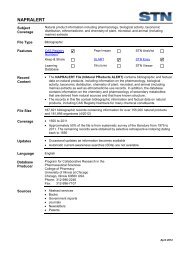DGENE Database Summary Sheet (DBSS) - STN International
DGENE Database Summary Sheet (DBSS) - STN International
DGENE Database Summary Sheet (DBSS) - STN International
Create successful ePaper yourself
Turn your PDF publications into a flip-book with our unique Google optimized e-Paper software.
19<br />
<strong>DGENE</strong><br />
DESCRIPTION: Human secreted protein-encoding gene 19 cDNA clone HYASC80,<br />
SEQ ID NO:78.<br />
KEYWORD:<br />
Human; secreted protein; proliferative disorder; cancer;<br />
tumour; foetal abnormality; developmental abnormality;<br />
haematopoietic disorder; immune system disorder; AIDS;<br />
autoimmune disease; rheumatoid arthritis; inflammation;<br />
allergy; neurological disorder; Alzheimer's disease;<br />
Parkinson's disease; cognitive disorder; schizophrenia;<br />
asthma; skin disorder; psoriasis; sepsis; diabetes;<br />
atherosclerosis; cardiovascular disorder; angiogenic<br />
disorder; kidney disorder; gastrointestinal disorder;<br />
pregnancy-related disorder; gene therapy; endocrine disorder;<br />
infection; wound healing; vulnerary; cell culture;<br />
chemotaxis; food additive; binding partner identification;<br />
ss.<br />
ORGANISM:<br />
Homo sapiens.<br />
ABSTRACT:<br />
AAD05492-AAD05564 represent cDNAs corresponding to 22 human secreted<br />
protein genes, and AAE01672-AAE01743 represent the proteins they encode.<br />
AAE01744-AAE01763 represent human secreted protein fragments or variants.<br />
The secreted proteins and their genes are useful for preventing, treating<br />
or ameliorating medical conditions, e.g., by protein or gene therapy.<br />
Pathological conditions can be diagnosed by determining the amount of the<br />
new protein in a sample or by determining the presence of mutations in<br />
the new genes. Specific uses are described for each of the 22 genes,<br />
based on the tissues in which they are most highly expressed, and include<br />
developing products for the diagnosis or treatment of proliferative<br />
disorders, cancer, tumours, foetal and developmental abnormalities,<br />
haematopoietic disorders, diseases of the immune system, AIDS, autoimmune<br />
diseases (e.g., rheumatoid arthritis), inflammation, allergies,<br />
neurological disorders (e.g., Alzheimer's disease, Parkinson's disease),<br />
cognitive disorders, schizophrenia, asthma, skin disorders (e.g.,<br />
psoriasis), sepsis, diabetes, atherosclerosis, cardiovascular disorders,<br />
angiogenic disorders, kidney disorders, gastrointestinal disorders,<br />
pregnancy-related disorders, endocrine disorders, and infections. The<br />
proteins can also be used to aid wound healing and epithelial cell<br />
proliferation, to prevent skin aging due to sunburn, to maintain organs<br />
before transplantation, for supporting cell culture of primary tissues,<br />
to regenerate tissues, to identify their cognate ligands or binding<br />
partners, and in chemotaxis, and can be used as a food additive or<br />
preservative to modify storage properties. Antibodies specific for a<br />
protein of the invention can be used in alleviating symptoms associated<br />
with the disorders mentioned above, and in diagnostic immunoassays e.g.,<br />
radioimmunoassay or enzyme linked immunosorbent assay (ELISA). The<br />
present sequence represents a human secreted protein-encoding cDNA of the<br />
invention.<br />
NUCLEIC ACID COUNTS: 8 A; 16 C; 20 G; 14 T; 2 other<br />
SEQUENCE LENGTH: 60<br />
SEQUENCE<br />
1 ggggatggga acccaaggct gtccacatcc cagctggctg mtmcttctgg<br />
51 ggctgtcttg<br />
May 2013



